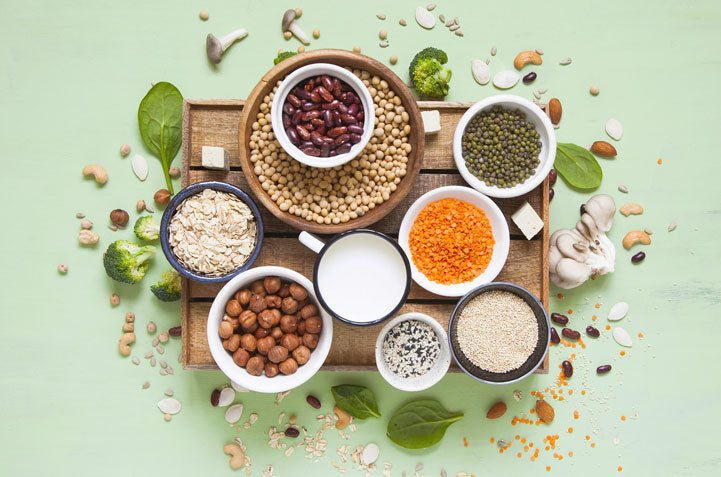Complete Protein: Finding it in Plant-Based Foods

Of the three nutrients that fuel our bodies—carbohydrates, proteins and fats—proteins are known as the “building blocks of life.” Proteins help our bodies repair themselves, digest food and grow stronger, among other functions.
But not all protein sources are equal: A complete protein contains all nine essential amino acids the body needs but can’t produce on its own. Animal-based foods like eggs, dairy, fish and meat contain complete proteins, but plant-based proteins can also be complete—and what matters most is that we get complete proteins as we eat throughout the day, not just from one meal.
While most beans and nuts aren’t complete proteins, they can be complemented by other nutritious foods such as grains, seeds or nuts to create a complete protein—at the same meal or throughout the day. Hilary’s Southwest Adzuki bean veggie burger is a prime example of this pairing, packing a powerful punch thanks to Adzuki beans, whole grain millet, sweet potato, green chilies and lime.
At Hilary’s, we create delicious foods that help you meet your protein needs from plant-based sources that offer a healthier option for you and the planet.
Mighty Beans and Beyond
Beans are a powerful plant-based protein source that also contain key nutrients including folate, zinc, iron and magnesium. High in fiber and low in saturated fats, beans are lower in calories than many other protein sources.
Eating protein primarily from plant sources is associated with a reduced risk of dying from heart disease, according to a Harvard Medical School study. Other studies show that eating more beans can help lower cholesterol levels.
Thanks to that fiber, beans also can benefit gut health by “feeding” good bacteria during the digestive process and reducing gut inflammation.
Beyond all of those great health benefits, beans provide taste and texture as real, whole ingredients for some of our favorite Hilary’s products.
The mighty Adzuki bean stars in two of Hilary’s veggie burgers: Black Rice and Southwest Adzuki Bean. Studies find the Adzuki bean to be high in antioxidants that counter disease and aging.
Though they’re small, seeds such as lentils and millet are another big source of plant-based protein and other nutrients. Lentils also are a great source of iron, which helps our body make red blood cells and carry oxygen, and benefit gut health thanks to healthy amounts of fiber.
If you’re looking for a protein-powered breakfast food, Hilary’s Apple Maple and Spicy Veggie Sausage varieties feature lentils as a key ingredient.
Better for the Planet’s Health
The health benefits of plant-based proteins aren’t just for humans—they help the Earth too. Meat and dairy products generally require more natural resources, like land and water, than plant-based foods such as beans and seeds, which also benefit soil health.
Beans are a sustainable crop, requiring about 43 gallons of water per pound to produce, compared with 800 to 1,800 gallons of water for production of a pound of animal protein. They boost soil health by leaving behind nitrogen and other nutrients and are hearty crops that can withstand drought and frost.
An online scorecard from the World Resources Institute compares the environmental impact of protein sources, confirming that beans are a low-cost, low-impact food.

